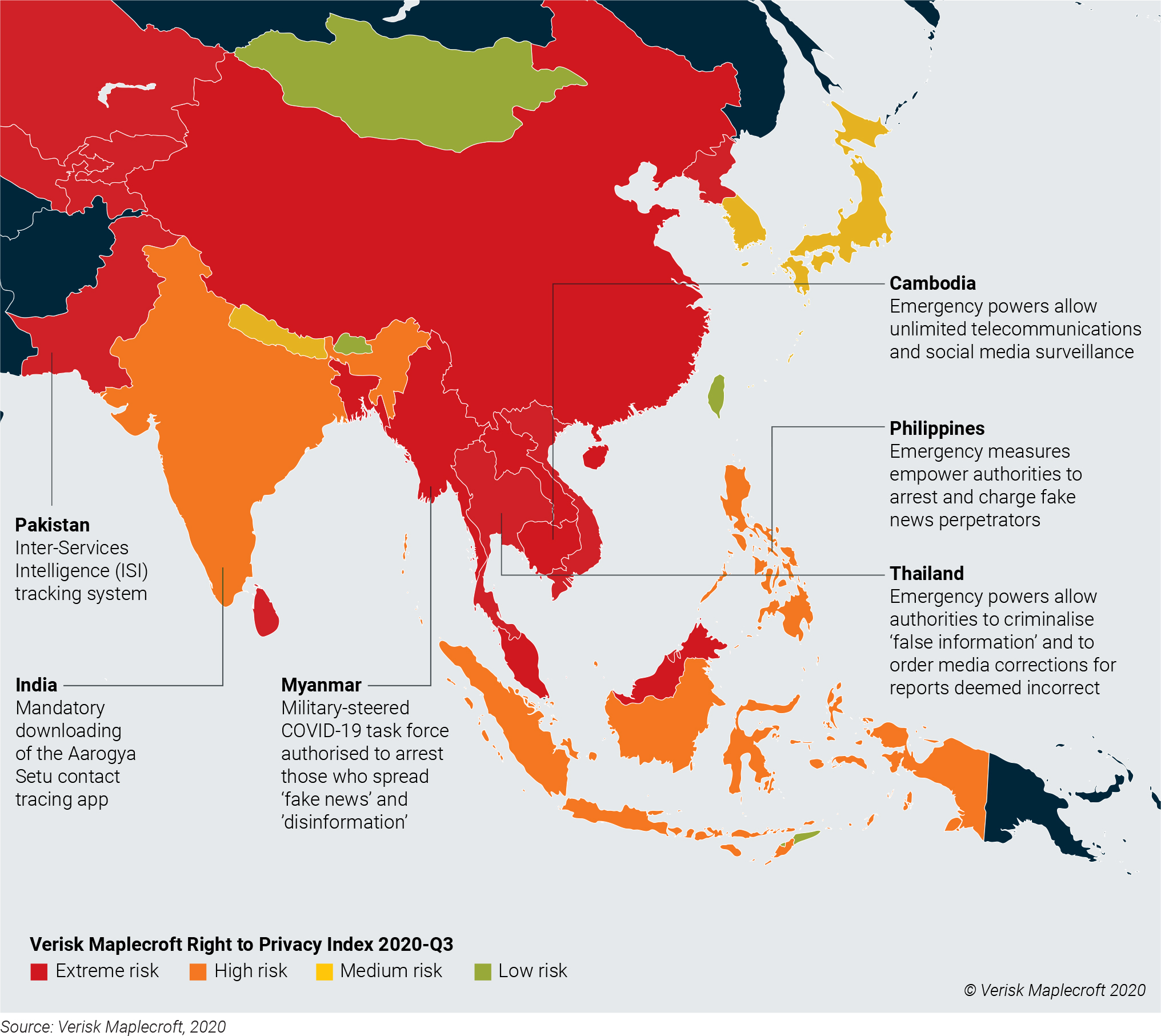Asia emerges as world’s surveillance hotspot
Human Rights Outlook 2020
by Sofia Nazalya,
People across the world have given up elements of their privacy and freedom to their governments in order to stem the tide of the coronavirus. While compromises to these rights are to be expected in these unprecedented times, a danger is emerging that some states are unlikely to relinquish new-found powers and tools of mass surveillance once the health crisis recedes. According to our research and data, this risk is most pronounced in Asia, where these excessive measures are threatening to erode human rights in countries across the region.
Asia is now the highest risk region in both our Right to Privacy and Freedom of Opinion and Expression indices. Its score has steadily worsened in the indices over the last four years, and we expect it to cement itself as the world’s surveillance hotspot as extreme measures and unchecked powers are extended and eventually become permanent fixtures of state governance.
Register now for our webinar where we discuss this insight in further depth
We are already seeing this in China, where an app developed to track the coronavirus is being made permanent. As COVID surveillance measures are extended in the region, there is a risk that governments will have unrestricted access to personal data linked to location, medical history, and other sensitive information. In countries with questionable civil and political rights records, the danger lies in authorities exploiting such data for political ends to stymie opposition and curtail free speech.
The region’s ‘strongmen’ in the Philippines, Cambodia and India will follow China’s lead by extending COVID-19 measures in the name of battling the coronavirus. However, the downward trend for privacy and free speech in the region is unlikely to stop there. COVID-19 measures are also accelerating the trend of declining civil and political rights in Thailand, Myanmar and Pakistan.
New-found powers will be hard to resist for some
India is the only democracy that has made the downloading of a COVID tracking app mandatory, or face threat of jail or fines. With the lack of institutional oversight and clear guidance on an end-date to the app’s use, the government is empowered to collect personal data without any accountability. Along with plans to implement a national database by 2021, privacy rights are set to worsen in the coming years.
A comparable situation is developing across the border in Pakistan, where a secretive militant-tracking surveillance system is being used to monitor coronavirus patients. The expansion of this technology, operated by the country’s intelligence agency, and the absence of data protection laws stoke fears on how collected data could be used against Pakistan’s citizens.
In Cambodia, Thailand and the Philippines, we are seeing surveillance ramp up in other ways. All three countries have enacted emergency measures empowering authorities to crackdown on ‘false information’ or ‘fake news’ pertaining to the coronavirus. Authorities have, however, used these increased powers to silence whistleblowers and government critics, giving rise to concerns that free speech is under threat.
Provisions allowing for the unlimited surveillance of telecommunications and social media in Cambodia were designed so these powers could be used even after the pandemic. Prime Minister Hun Sen’s increasing grip on power runs in tandem with the country’s deteriorating performance in our Freedom of Opinion Index, where it is now the second-worst performing country in Asia, behind only North Korea.
Similarly, the Duterte government is likely to expand these restrictions as part of an ever-growing list of controls on free speech and assembly in the Philippines, which includes the Anti-Terrorism Act. We also expect the quasi-military governments in Myanmar and Thailand to continue to use the pandemic as a pretext to quash dissent, as they have done since the beginning of the outbreak.
Workplaces will be increasingly policed
Companies in restrictive environments will have to contend with expanding government mandates to police public spaces, including the workplace. The compulsory requirement for employees in India to download the government tracking app before returning to work is a glimpse into what is potentially in store for corporates elsewhere. Employees subject to these conditions may be at risk of excessive collection of personal information, potentially with little oversight and a vague understanding of how long their data may be stored for and who has access to it.
Download the full report
Human Rights Outlook 2020As surveillance measures are extended, particularly as part of ‘smart city’ plans that have bloomed across Asia, tech companies would do well to be aware of if or how their involvement in building this new digital infrastructure facilitates rights abuses. A fast-evolving regulatory and legal landscape reflecting growing ESG concerns increases compliance risks for companies operating in particularly high risk areas. In addition, corporate complicity in rights abuses is likely to be met with investor boycotts, shareholder activism and reputational backlash.
China leads, and the most authoritarian will follow
Asia is unlikely to be the only region that sees a backsliding in rights to privacy and free speech post-pandemic. Countries with weak democratic governance, particularly in Central Asia and the Middle East, have also seen increased surveillance in the wake of the coronavirus and are regions to look out for.
For much of Asia, the outlook for civil and political rights in the coming years remains dire as democratic norms continue to erode under the pretext of maintaining public health. For companies, this means having to confront increasingly complex environments that come with heightened risks.
